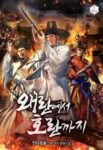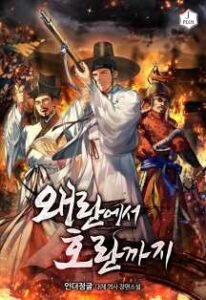Encounter
I was on my way to meet Yulgok Yi I.
Who was Yulgok Yi I?
He was a household name, the face of the 5,000 won note, and the son of Shin Saimdang, who herself earned a spot on the 50,000 won note for her contributions.
But the Yi I that I had come to know through my research was the greatest genius born in Joseon.
In his lifetime, he tirelessly worked for the reform of Joseon, but it was only in later generations that his efforts bore fruit.
Yet few would deny that his proposals were fundamental to the reform of Joseon.
However, we had heard of Yi I by name but rarely encountered him in popular media.
The reason being, Yi I lost his life around February 1584.
He was 47 years old at the time.
Considering it was now November 1583, I felt akin to having a conversation with a walking dead man who had merely three months left to live.
Meeting a walking dead man today or tomorrow, what could one possibly do?
There was a reason why I, who treated time as if it were gold, made time to meet Yi I.
Yi I was a figure who left behind the ideological foundation for Joseon’s reform after his death.
Naturally, the faction that followed him would become the ruling Seoin faction in subsequent regimes, despite his struggles to prevent factional politics.
What would Yi I think, seeing his disciples not only disobeying his will but also further solidifying political factions?
Along with personal curiosity, my meeting with him was motivated by the calculation that it could be a stepping stone to rubbing shoulders with Joseon’s future power elite.
“Here we are, at the residence of the Byungpan-daegam.”[1]
Indeed, with apologies to my second uncle, but compared to his house, this place was incomparably grand, as one might only see in historical dramas.
“Come this way.”
“Who is it?”
“Tell him that Kim Hyeongyu, an officer from the Office of Inspector General, has come to see the great official.”
The servant at the home of the high-ranking official didn’t seem surprised to hear my second uncle’s identity.
After all, one would expect an officer from the Office of Inspector General to have impressive credentials.
“Yes, My Lord. Please, follow me.”
Well, seeing him dressed up, he resembled our house’s upright steward, Kang Jik.
“Would you mind waiting here for a moment?”
“I shall.”
Shortly after, refreshments were served.
The level of hospitality was indeed exceptional.
The tea had a rich and profound aroma, and a variety of traditional Korean sweets were elegantly laid out.
As I was enjoying the provided snacks, the door opened.
Oh, has he finally arrived?
A middle-aged man with a gentle face entered the room.
Yes, he was indeed the man from the 5,000 won note, Yulgok Yi I.
“Ahaha, I’ve heard that Kim-daegan is quite sought after these days in the court. What brings you to me?”[2]
And this was the face of a man who was going to die in three months?
There were slight dark circles under his eyes, but that was the same with my second uncle.
I heard that officials in the Joseon Dynasty lived on a tight schedule, just shy of the king’s, so chronic fatigue was an unavoidable chronic illness.
And the fact that Seonjo was a bastard, yet a bastard who did his job well, was proven by the faces of these two men.
After all, the harder the government officials worked, the more comfortable the lives of the citizens became.
Seonjo, who kept these two busy, was undoubtedly a capable son of a bitch.
But with a complexion like that, he looked more like a typical South Korean office worker rather than someone on their deathbed.
Still, the life of a person was also called “Heaven’s will.”
No matter how healthy one looked, dying could be all too easy.
Perhaps, Yi I would pass away due to something like acute myocardial infarction.
“Cough, didn’t the Daegam recently mention something about fertilizer?”
“Ahaha! Was that just idle talk?”
How shameless!
Being the Minister of Military Affairs was equivalent to a second-grade official, ranking fourth if you exclude the Prime Minister in the national protocol.
Especially since the Minister of Military Affairs was akin to today’s Defense Minister, imagine what would happen if such a person casually said, “I don’t like that mountain.”
Likely, from that day on, the entire military might be found with shovels instead of guns in their hands.
The power of a Defense Minister in modern times was significant, how much more so would a Joseon Dynasty Minister of Military Affairs hold?
Probably, even a casual remark would have burdened my second uncle as much as a direct order from that son of a bitch king.
“How could I simply ignore the esteemed official’s request? I sent someone to your house right away to get a clear answer.”
“I’m truly grateful. So, how much is it?”
“I will tell you.”
“Um, and who might you be?”
“He is my nephew. The boy is the heir to our family line, so you can trust his words won’t be mere exaggerations.”
“The amount of fertilizer produced by the Gimhae Kim clan in a year, not including what’s needed for the cotton fields, is enough to cover 720 gyeol.”
“720 gyeol? So, a single family can almost take responsibility for 25,000 seok of food? That’s impressive!”[3]
“Our family’s fishermen are exceptionally skilled.”
While the Fair Wind was a large fishing vessel capable of considerable catch, not every voyage resulted in a full haul.
In reality, each ship could produce about 200 gyeol of fertilizer.
And with so many ships, we had even started major expansion works at Yeompo Harbor recently.
“If we exclude the fertilizer that must be returned to the family’s slaves, the surplus that can be spread is about 200 gyeol.”
“Only 200 gyeol?”
Well, from the standpoint of running a country, fertilizing 200 gyeol was hardly significant.
The increase in yield from those fields would barely amount to 3,000 seok, which was insufficient for state operations.
But what about this?
“If the noble families of Gyeongsang Province come together, we could spread fertilizer on at least a thousand gyeol of land.”
The increase in yield from that amount of land would be at least 10,000 seok, and if done well, up to 20,000 seok.
Assuming an adult consumed one seok of grain per year, that was enough food to feed 10,000 soldiers.
“The noble families coming together?”
There was a disapproving look on his face.
“If the noble families would lend their strength, it would be a welcome deed, but how can the world’s affairs only take and not give?”
I was not sure if Yi I was the genius Joseon produced, but one thing was clear: he knew his way around bargaining.
Dealing with such a person was both convenient and tricky.
If one made demands that crossed the line, it would be difficult to get such an opportunity again.
“So, what are the conditions demanded by the nobles of Gyeongsang Province?”
Gulp!
“Do you know about the recent invasion by pirates in Ulsan?”
“As the Minister of Military Affairs, how could I not know? His Majesty is also greatly concerned. At the beginning of the year, he mentioned how the barbarians from the north have recently stirred up the pirates from the south. It is troubling indeed.”
“For Gyeongsang Province to safely supply fertilizer, we must minimize the damage caused by the pirates. If you could increase the military force at Gyeongsang Left Naval District, the nobles of Gyeongsang would offer fertilizer to spread over a thousand gyeol annually.”
Did my proposal cross the line? Or not?
“…Interesting.”
In truth, the noble families were not responsible for taxes.
This was the result of the new nobility, who founded Joseon, looking out for their own interests first.
But what was the meaning of a state’s existence?
The people paid taxes, and the state used those taxes to protect its people.
Having witnessed the pirates’ invasion, the nobles discussed countermeasures while paying their respects.
As a result, they decided to offer a certain amount of fertilizer to the country in exchange for safety.
“I will discuss this matter closely with His Majesty.”
Still, by looking at his expression, he seemed quite proactive about this issue.
“And if you give me some time, I have a few more things to discuss with you.”
“…Is that so? Then when would be a good time?”
The Mysterious Little Boy
Yi I looked at the little boy stepping outside the gate with a curious expression.
Although the boy stepped outside with his uncle, looking just like any other child, Yi I knew.
This boy was no ordinary child!
What a curious child.
Normally, in front of a powerful figure, one would be cautious not to fall out of favor.
As proof, even the kid’s uncle, an officer of the Office of Inspector General who could bring down a bird in flight, was careful in his presence.
But the boy he just met was different.
He made his demands clearly, without crossing any lines.
Yi I needed strong soldiers to create the Joseon he dreamed of, and for that, he needed to take care of the common people.
The most pressing need to increase the population was, of course, the issue of food.
That’s why Yi I first argued that the tax issue needed to be addressed.
Aware of the suffering the people endured due to excessive levies, he advocated for a tax policy to replace the levies.
However, his proposals were repeatedly blocked by the moderates remaining after the radical reformers were swept away.
Yet, he did not back down from his stance and recently managed to brilliantly resolve the mutiny, earning even deeper trust from King Seonjo.
But now, instead of clashing with the existing political forces over the tax issue, we have found another method.
That was fertilizer.
Basically, increasing the supply of fertilizer resulted in a corresponding increase in income.
And naturally, an increase in income would lead to an increase in tax revenue.
Moreover, the boy argued that the nobles of Gyeongsang Province could voluntarily offer “taxes.”
It was clear that even without the nobles offering fertilizer, the state would naturally prosper over time.
But the wealth of the nobles did not necessarily mean the state was also wealthy.
But what if the state could supply the fertilizer?
He felt chills all over his body.
The genius known as Yi I pondered what could be achieved with fertilizer.
Fertilizer could be used to increase the stipends for officials, and it could be spread on government fields to produce more military rations. Not only that, but it would also lead to increased yields for the people, who would then have more to eat.
He could hardly believe such a dream-like situation was unfolding.
Maintaining public order is also crucial. What if the supply of fertilizer being produced in Gyeongsang Province was suddenly cut off?
The nobles would face considerable difficulties because of the sudden decrease in their income.
And if the nobles were in trouble, so too would King Seonjo be.
After all, King Seonjo was a figure without traditional legitimacy.
Perhaps that’s why he had been so sensitive to the public sentiment in the provinces.
Yi I, who had been watching from the sidelines, thought that strengthening Gyeongsang Left Naval District was the perfect solution to alleviate King Seonjo’s worries.
The more he thought about it, the more the boy’s proposal seemed to scratch an itch.
Like having an itch and someone scratching it for you?
He was looking forward to what the boy promised to show him.
Didn’t he say he would show me something interesting in a couple of months?
It was like going back to his childhood when he would excitedly wait for new clothes for the New Year.
“Ahaha, have I returned to my childhood?”
[1] Roughly translated to as Lord Commander. “Byungpan” refers to a high-ranking military officer while “daegam” is an honorific title.
[2] “Daegan” typically refers to high-ranking officials or senior court advisors in the Joseon Dynasty.
[3] 1 gyeol = 2.45 acres, 1 seok = 180 liters






